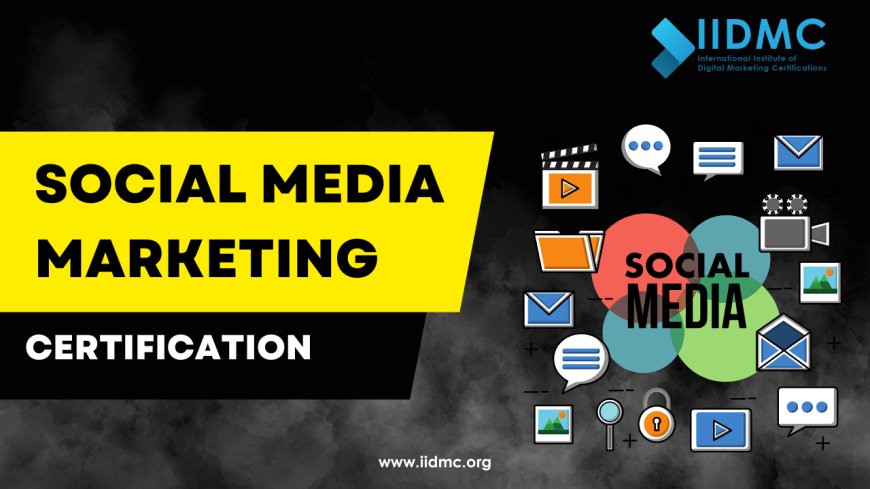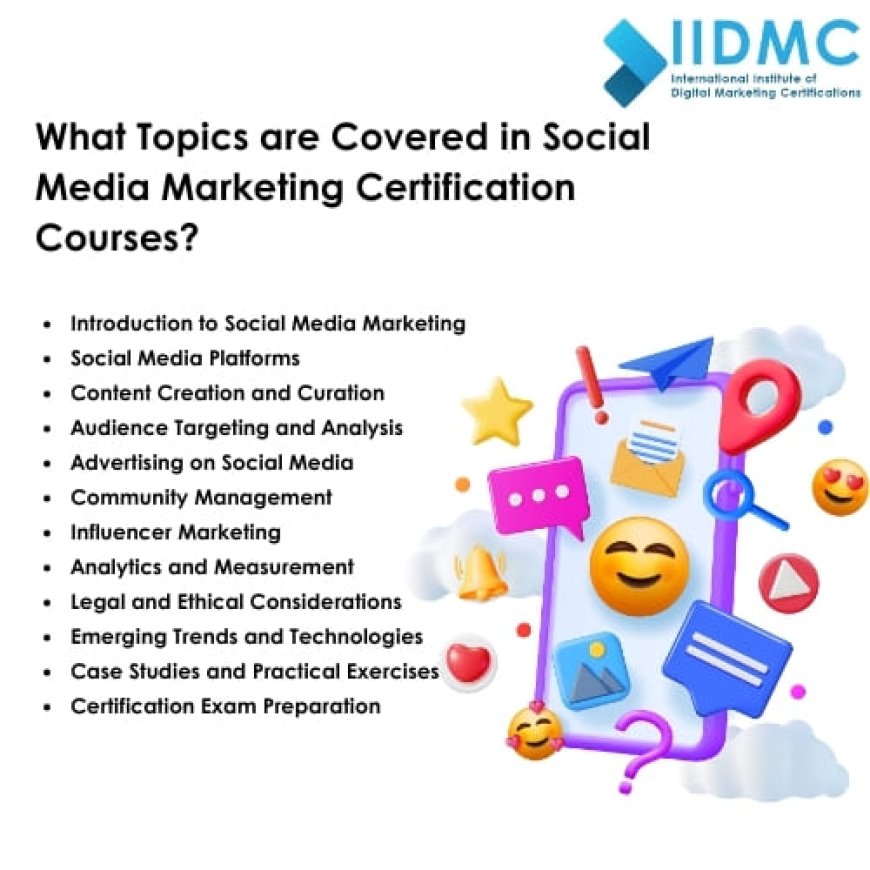Career with Social Media Marketing Certification

Social media marketing involves leveraging platforms like Facebook, Instagram, Twitter, and LinkedIn to promote products or services. This strategy includes posting updates, engaging with followers, and responding to customer queries, which enhances direct interaction with the audience. It's crucial for maintaining brand visibility and fostering customer loyalty by facilitating a direct communication channel that also generates valuable consumer insights through interaction data.
Social media marketing certification encompasses a formal validation of an individual's expertise in strategies, tools, and analytics specific to social media. Various educational entities and online platforms offer these certifications to equip marketers with essential skills for effectively managing campaigns. This includes crafting impactful strategies, analyzing campaign success, and optimizing approaches based on analytical insights, ensuring marketers are well-prepared to meet the demands of the digital marketing landscape.
What is Social Media Marketing Certification?
Social media marketing certification verifies an individual's skills in using social platforms effectively for marketing. These certifications aim to prove proficiency in strategies, tools, and analytics, helping marketers manage and optimize their online campaigns. Educational bodies, online learning platforms, and major social media networks like Facebook and Google offer these certifications, each focusing on different aspects of social media usage.
The types of certifications available vary widely. Some are comprehensive, covering all key aspects of social media marketing, while others focus on specific skills such as content creation, strategic planning, or data analysis. This variety allows newcomers and seasoned marketers to find a program that suits their needs, whether they are looking to start a new career path or enhance their current marketing strategies.
Benefits of Getting Certified
-
Learn More and Improve Skills: Certification helps you gain new knowledge and practical skills that are important for your job. You learn the best ways to do things and the tools you need.
-
Better Job Opportunities and Career Growth: Having a certification can help you get noticed by employers. It shows you have the right skills and are dedicated to your work, which can lead to better job offers and career progress.
-
Build Trust and Credibility: Certification makes you more credible to employers and clients. It proves you know your stuff and are committed to your field, which helps build trust in your abilities.
-
Stay Updated with New Trends and Tools: Certification programs teach you about the latest trends and tools in your field. This keeps you up-to-date and ready for changes in your industry.
Key Components of a Certification Course
-
Strategy: Understanding the basics of developing and implementing effective strategies is crucial. This includes learning about target audience analysis, goal setting, and planning methods.
-
Content Creation: This section teaches how to create engaging content. It covers various types of content, including articles, videos, and social media posts, focusing on techniques to make content appealing and relevant.
-
Analytics: Here, students learn how to measure the effectiveness of their strategies and content. This involves using different analytical tools to track performance, understand metrics, and make data-driven decisions.
Practical Skills Gained and Tools Learned
Practical Skills
-
Planning and Strategy: Learn to design and execute plans that align with business goals.
-
Content Development: Gain skills in creating diverse types of content tailored to different platforms and audiences.
-
Data Analysis: Understand how to collect and analyze data to improve strategies and outcomes.
Tools Learned
-
Content Management Systems (CMS): Tools like WordPress for managing and publishing content.
-
Analytics Tools: Google Analytics and other similar tools to track and analyze performance.
-
Social Media Tools: Platforms like Hootsuite or Buffer for managing social media campaigns.
A certification course combines these elements to equip students with a solid foundation and practical skills. The focus is on ensuring students can apply what they learn directly to real-world scenarios, making them more effective in their roles.

Steps to Getting Certified
Enrolling in a course involves a few straightforward steps:
-
Research Courses: Look for courses that match your career goals and interests.
-
Visit the Course Website: Find the official website of the course provider.
-
Sign Up: Complete the registration form with your personal information.
-
Choose a Course: Select the course you want to take.
-
Make Payment: Pay the course fee to finalize your enrollment.
-
Receive Confirmation: You will get a confirmation email with course details.
Completing Coursework and Assignments
After enrolling, you need to complete coursework and assignments. Here’s how:
-
Access Course Materials: Log in to the course portal to find lectures, reading materials, and resources.
-
Follow the Schedule: Keep up with the course schedule to stay on track. Participate in discussions, and join online forums and group discussions to enhance your learning.
-
Submit Assignments: Complete and submit assignments by the due dates.
-
Ask for Help: If you have questions, reach out to your instructors for assistance.
Preparing for and Passing the Certification Exam
To get certified, you need to prepare for and pass the certification exam. Here’s how:
-
Understand the Exam: Review the exam guide to know the format, topics, and guidelines.
-
Study Consistently: Create a study plan and stick to it, focusing on important topics.
-
Practice with Sample Tests: Use sample questions and mock exams to prepare.
-
Join Study Groups: Study with others to exchange knowledge and tips.
-
Rest Well: Ensure you get enough rest before the exam day.
-
Take the Exam: On exam day, follow the instructions carefully and manage your time effectively.
By following these steps, you can enroll in a course, complete the required coursework, and pass the certification exam to achieve your certification.
Choosing the Right Certification Program
Factors to Consider
-
Accreditation: Ensure the program is recognized by relevant industry bodies. Accredited programs are often more respected by employers and can add more value to your resume.
-
Content: Look at the curriculum to make sure it covers the topics you need. It should be up-to-date and relevant to current industry standards and practices.
-
Instructors: Research the instructors' backgrounds. Experienced and knowledgeable instructors can provide valuable insights and a better learning experience.
-
Cost: Consider the cost of the program and what you are getting for your money. Compare different programs to find one that fits your budget without compromising on quality.
When choosing a certification program, it's important to evaluate these factors carefully. This helps ensure that the program you select will meet your needs and support your career goals.
A social media marketing certification offers various benefits, including gaining valuable skills, improving your understanding of marketing strategies, and enhancing your job prospects. Pursuing this certification can help you advance your career by making you more knowledgeable and competitive in the job market. Taking the step to get certified is a worthwhile investment in your professional development.




























